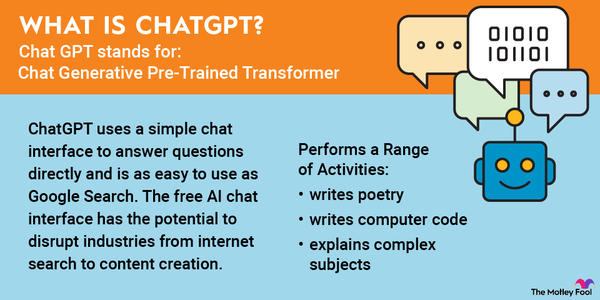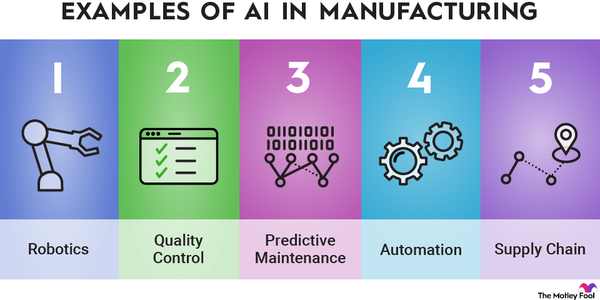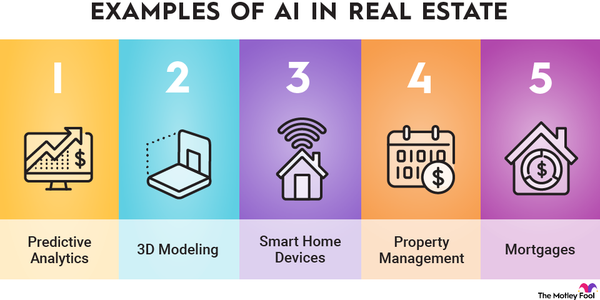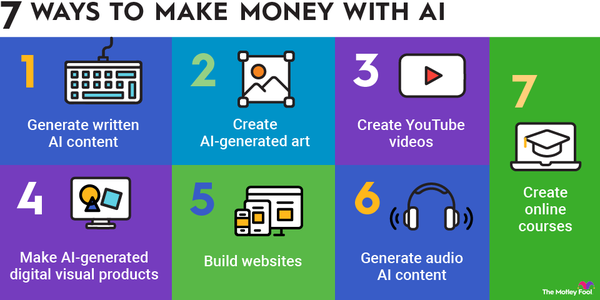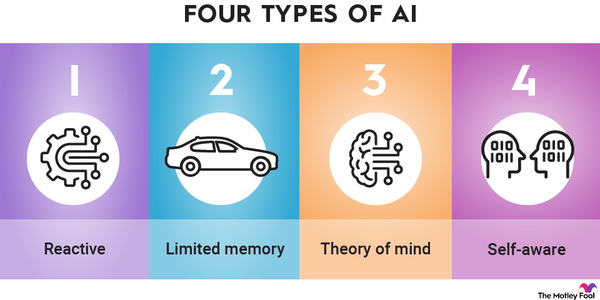You probably interact with artificial intelligence (AI) more often than you think. AI is powering the algorithm arranging your Netflix (NFLX -0.14%) menu, the software expediting your Amazon (AMZN -0.87%) package, and the brains behind many smartphone apps you use every day.
Artificial Intelligence
If you've used ChatGPT, the OpenAI chatbot that has wowed users by writing code and instantly answering complex questions or a similar chatbot, then you've gotten a glimpse into the next frontier in AI, known as generative AI. Big tech companies, including Alphabet's (GOOG -1.34%) (GOOGL -1.37%) Gemini and Meta Platforms' (META -1.39%) Meta AI, have developed AI chatbots and other generative AI technologies. Meta just said that Meta AI now has almost 1 billion active users.

If you want portfolio exposure to AI companies but don't want to identify individual AI stocks, investing in an AI-focused exchange-traded fund (ETF) is a good option. AI ETFs provide exposure to a broad range of the best AI companies, so you don't need to research and choose individual stocks on your own.
Best AI ETFs
Best AI ETFs to buy in 2025
| AI ETF | Assets Under Management | Expense Ratio |
|---|---|---|
| Global X Robotics & Artificial Intelligence ETF (NASDAQ:BOTZ) | $2.36 billion | 0.68% |
| ROBO Global Robotics and Automation Index ETF (NYSEMKT:ROBO) | $927.1 million | 0.95% |
| iShares Future AI & Tech ETF (NYSEMKT:ARTY) | $788.1 million | 0.47% |
| First Trust Nasdaq Artificial Intelligence and Robotics ETF (NASDAQ:ROBT) | $414.3 million | 0.65% |
1. Global X Robotics & Artificial Intelligence ETF
Established in 2016, the Global X Robotics & Artificial Intelligence ETF is a fund that invests in "companies that potentially stand to benefit from increased adoption and utilization of robotics and artificial intelligence." This includes enterprises working in industrial robotics, automation, nonindustrial robots, and autonomous vehicles.
The ETF held 49 stocks in mid-2025. Accounting for about 45% of the fund's assets, its top five holdings were:
- Keyence (KYCCF -3.78%): A Japanese company that makes factory automation products, such as sensors and scanners.
- Nvidia (NVDA -1.02%): Semiconductor maker whose chips are used in a wide variety of applications -- including autonomous vehicles, virtual computing, and cryptocurrency mining -- and are central to many AI technologies.
- Intuitive Surgical (ISRG -0.51%): Maker of the da Vinci robotic surgical system, which allows for minimally invasive surgeries with precise control.
- ABB (ABBN.Y -1.2%): Swiss maker of industrial automation and robotics products for use in utilities and infrastructure.
- Fanuc (FANUY 0.7%): A Japanese maker of factory automation products, including motors, lasers, and robots.
As the chart below shows, shares of the ETF have underperformed the S&P 500 index since its 2016 launch. The share price fell sharply in 2022 in line with the broad sell-off in tech stocks, although it has rebounded since then.
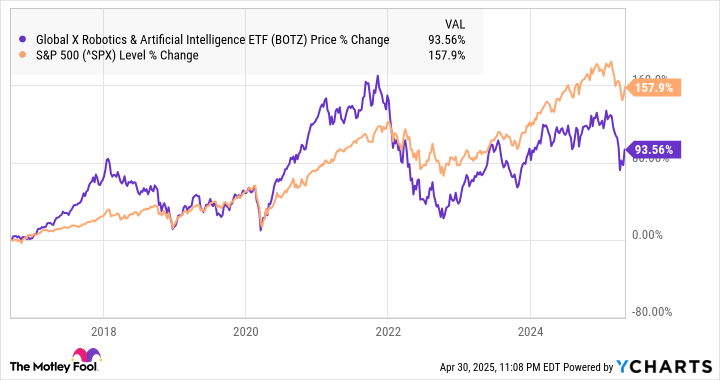
This ETF offered a modest dividend yield of 0.15% in early 2025, but it is better suited as a growth-oriented investment. It's an actively managed fund with an expense ratio of 0.68%, which is higher than what you'd pay for most index funds.
2. ROBO Global Robotics and Automation Index ETF
The ROBO Global Robotics and Automation Index ETF focuses on companies driving "transformative innovations in robotics, automation, and artificial intelligence." This ETF invests in companies primarily focused on AI, cloud computing, and other technology companies.
Cloud Computing
The ETF holds 75 stocks, with no single holding accounting for more than 3.5% of the ETF's value. Its top five holdings comprise only about 10% of the fund's total value. In mid-2025, major holdings included Fanuc and four others:
- Intuitive Surgical: Maker of the da Vinci surgical robot. The da Vinci performs minimally invasive procedures with greater precision than a surgeon.
- Toyota Industries: The original parent company of Toyota Motor, which it spun off in 1937, Toyota Industries now makes forklifts cars, engines, and related auto parts and machinery.
- Yokogawa: Another Japanese company, Yokogawa is a maker of industrial automation equipment like meters, control systems, and software products.
- Cadence Design Systems: Cadence Designs makes software is used for chip design, and it's a major competitor in electronic design automation tools.
Since its inception in 2013, the ROBO Global Robotics and Automation Index ETF has underperformed the S&P 500, as the chart below shows. It trails the broad market index, with dividends factored into the return. The ETF pays a dividend yield of 0.6%, and its expense ratio is 0.95%.
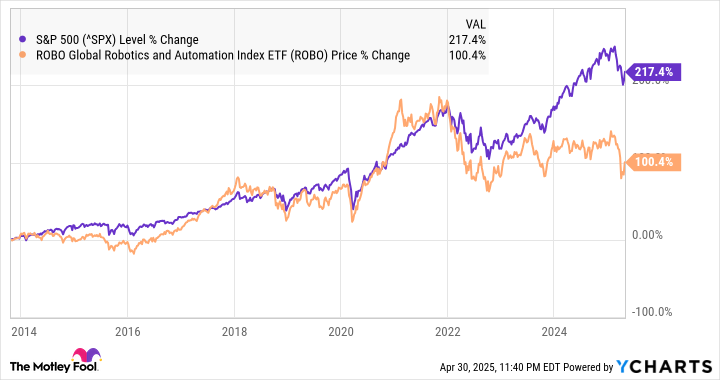
3. iShares Future AI & Tech ETF
The iShares Future AI & Tech ETF, formerly traded under the ticker IRBO, aims to track the results of an index of developed and emerging market companies that could benefit from long-term opportunities in robotics companies and AI. The ETF was formed in 2018 and has less than $1 billion of assets under management.
With 50 stock holdings, it's now well diversified. Many of its top holdings also give investors exposure to fast-growing small-cap companies. The fund's top five investments as of April 30 accounted for about 25% of the ETF's assets and included:
- Vertiv (VRT 0.03%): A maker of infrastructure technologies for data centers, communication networks, and industrial applications. Its systems help manage power supply, cooling, and monitoring.
- Arista Networks (ANET -1.46%): Arista is best known for high-end ethernet switches, and it focuses on the data center market. Its business has soared during the AI boom as companies are rapidly establishing data centers.
- Broadcom (AVGO -0.62%): A semiconductor giant best known for its prowess in areas like networking and custom chips, Broadcom is seen as a winner in AI. The company has also grown by acquisitions over the years, taking over VMware in November 2023.
- Advanced Micro Devices (AMD -0.25%): The chipmaker is best known for making chips for PCs and gaming platforms, but investors have hoped it would break into AI with its MI300 accelerator. However, the company has struggled to gain market share.
- Nvidia: This chipmaker creates the must-have data center graphics processing units (GPUs) for the AI era and has built a complex ecosystem, including the CUDA software library, that has created barriers to entry and switching costs.
As you can see from the chart below, the ETF has underperformed the S&P 500 since its founding. The ETF fell in 2022 when tech stocks crashed.
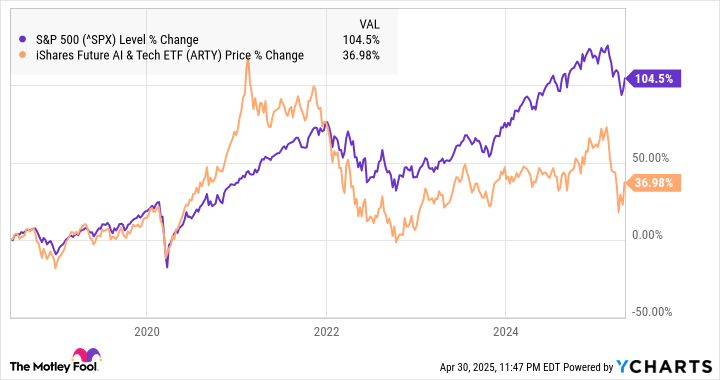
The expense ratio is competitive at 0.47%, and the trailing-12-month yield in April 2025 was 0.59%. The fund's performance will likely be heavily influenced by the overall performance of cloud and chip stocks since these are its largest areas of exposure.
4. First Trust Nasdaq Artificial Intelligence & Robotics ETF
First Trust Nasdaq Artificial Intelligence and Robotics ETF tracks the Nasdaq CTA Artificial and Robotics index, which comprises companies engaged in AI and robotics in technology, industrials, and other sectors. The fund currently holds 101 stocks, and the top holdings as of April 30 were:
- Palantir (PLTR 0.97%): Cloud software company known for deep data mining AI capabilities and working closely with the U.S. military.
- Cadence Design Systems (CDNS -0.19%): Known for electronic design automation software used to verify chips and chipsets and tools that help design systems on chips (SoCs).
- Ocado Group (OCDD.Y -0.7%): An online grocery retailer based in the U.K. that provides a suite of services to other retailers, including automation solutions.
- Pegasystems (PEGA -3.3%): A maker of AI-powered workflow automation software focused on streamlining productivity.
- NICE (NICE -0.95%): Provides a suite of AI and automation products to facilitate customer service centers and workforce management tools.
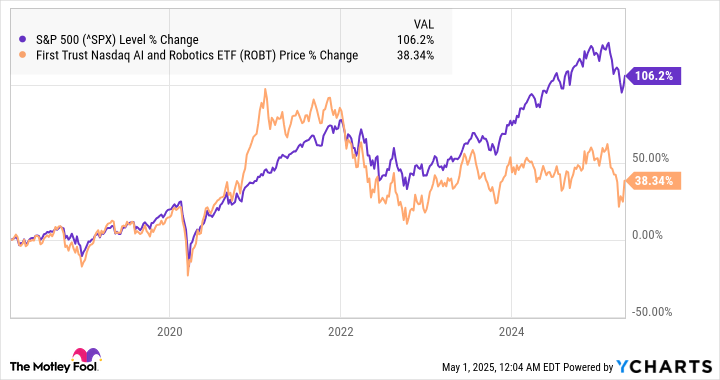
Related investing topics
Should I buy?
Should I buy AI ETFs?
The best way to decide which ETF to buy is to consider which stocks a fund holds and how many are true AI companies. A fund's expense ratio, dividend yield, and past performance are also important, and you can opt to invest in a basket of all four of these AI ETFs to maximize your diversification.
Over time, AI will grow smarter and play a greater role in our daily lives. Already, AI represents a global market worth hundreds of billions of dollars, and its wide range of practical applications includes face recognition, predictive algorithms in internet search, smart-home devices, and autonomous vehicles. So, pay attention to the AI market now, and you may find yourself reaping the rewards in years to come.
FAQs
Investing in artificial intelligence ETFs: FAQs
Which ETF is best for AI?
AI investors have several options in ETFs. The best-known of the AI ETFs above is Global X, which holds a number of well-known AI stocks, including Nvidia and Intuitive Surgical. AI investors may also want to consider an ETF that tracks the Nasdaq-100, such as the Invesco QQQ ETF (NASDAQ: QQQ), because big tech companies with exposure to AI make up almost half of the fund.
Does Vanguard have an AI ETF?
Vanguard does not currently offer an AI-focused ETF. However, the asset manager offers an information technology ETF that includes several AI stocks.
What is the best AI to invest in?
Nvidia is currently the best-known AI stock and has also been the most successful stock in AI. Past performance does not guarantee future returns, but it makes sense to invest in ETFs with exposure to Nvidia and other AI chip stocks as they emerge.
Does Charles Schwab have an AI ETF?
Charles Schwab (NYSE: SCHW) does not have an AI ETF. However, the brokerage firm does have an AI "theme" that contains as many as 25 AI stocks that Schwab account holders can buy together, based on Schwab's proprietary algorithms and research.











